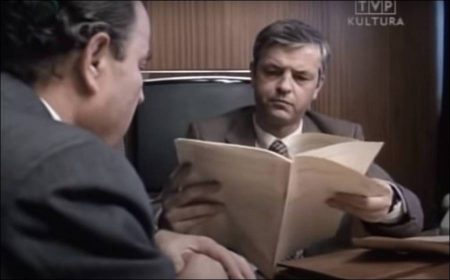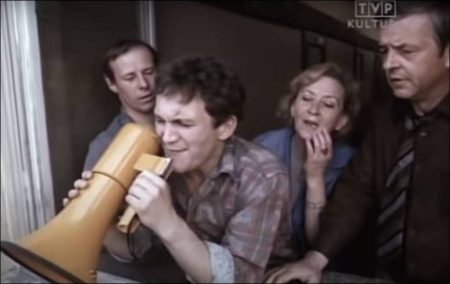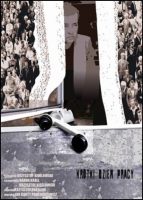Short Working Day movie storyline. In 1968, a young man addresses a meeting of protesters by condemning the firebrands who are agitating the students. Eight years later, in Radom, Poland during the June 1976 protests, the young man is now the local First Secretary of the Communist Party (Wenceslaus Ulewicz).
He is facing a mob of strikers protesting a 69 percent increase in food prices by the central government. Demonstrations in the industrial towns of Radom and Plock quickly lead to the beating and firing of thousands of workers. The party secretary tries to appease the crowds of workers massing beneath his window. Despite the growing threat, he decides to stick it out at the party’s office instead of making the recommended hasty escape.
While the protesters become increasingly hostile in their calls for a repeal of the price increases, the party secretary remains strong outwardly in his speeches. With bullhorn in hand, he believes he can talk and reason with the protesters. When he is alone, however, he seems lost in his private thoughts and fears. As the morning passes, the secretary becomes increasingly vulnerable because the central government refuses to yield to the protesters’ demands. By the afternoon, the party secretary finally yields to the police chief’s orders that he leave his office. As the secretary exits the building, the protesters set fire to his office furniture. Five years later, the same secretary is on television explaining his actions during the June 1976 protests.
Short Working Day (Polish: Krótki Dzień Pracy) is a Polish film directed by Krzysztof Kieślowski. Written by Kieślowski and Hanna Krall, the film is about the workers protests in June ’76 in Radom, as seen from the perspective of the local Secretary of the Polish United Workers’ Party. The film is based on real events, but the characters are fictional. Short Working Day was filmed in 1981, but had its official premiere on television only in 1996. During these 15 years, however, it was shown many times in film clubs and at special movie show-times.
Brief Review for Short Working Day
A short working day for sure: the main character is unable to complete his regular hours. But what a day it is. A local party secretary (this is still the time when Poland was behind the iron curtain) has to face a mob of strikers protesting hefty increases in food prices by the central government. The embattled secretary decides at first to stick it out at the party’s office instead of making the recommended hasty escape. Most of the footage is from the point of view of the party secretary. His thoughts and stratagems to deal with the protesters is done through voice-over. The confrontation between mob and the party leads to a tense, suspenseful situation.
This film reminded me of the political thrillers that were a trademark of director Costa Gravas. The difference here is that most of the action is limited to one location. The scenes of the mob surrounding the entrance to the party building are well done and convincing. During those mob scenes, there are inserts that break up the main action to explain who are and what happened later to some of the protesters. Didactic as those may be, they end up as mere distractions. Fortunately each is short and you are quickly back into gripping uncertainty.
Short Working Day (1981)
Directed by: Krzysztof Kieślowski
Starring: Waclaw Ulewicz, Lech Grzmocinski, Tadeusz Bartosik, Elzbieta Kijowska, Marek Kepinski, Pawel Nowisz, Barbara Dziekan, Marian Gancza, Wojciech Pilarski, Jan Konieczny, Zbigniew Bielski, Miroslaw Siedler, Tadeusz Pluciennik
Screenplay by: Hanna Krall, Krzysztof Kieślowski
Production Design by: Andrzej Rafal Waltenberger
Cinematography by: Krzysztof Pakulski
Film Editing by: Elzbieta Kurkowska
Costume Design by: Agnieszka Domaniecka
Set Decoration by: Borzyslawa Chmielewska
Music by: Jan Kanty Pawluskiewicz
MPAA Rating: None.
Distributed by: Telewizja Polska (TVP)
Release Date: February 5, 1981
Views: 184


